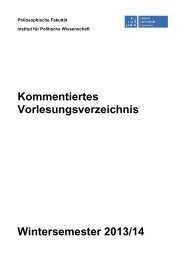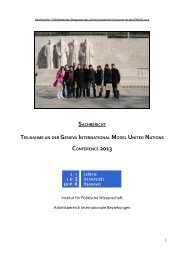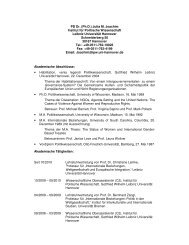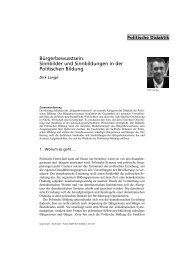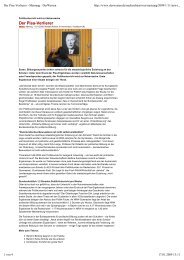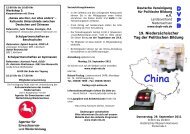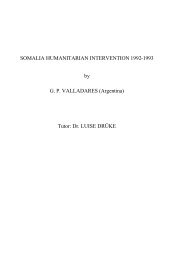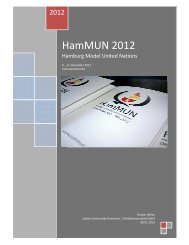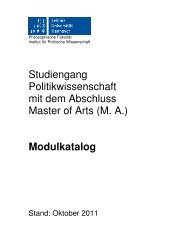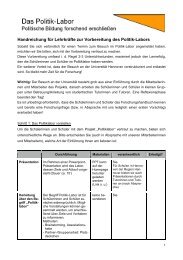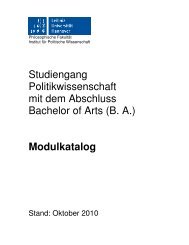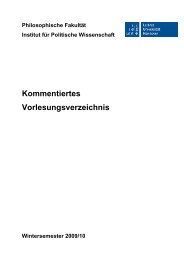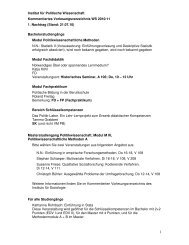Preventive Action for Refugee Producing Situations
Preventive Action for Refugee Producing Situations
Preventive Action for Refugee Producing Situations
You also want an ePaper? Increase the reach of your titles
YUMPU automatically turns print PDFs into web optimized ePapers that Google loves.
180 Chapter 4<br />
ef<strong>for</strong>ts of the United Nations organs within the Secretariat, 408 UNHCR,<br />
as a subsidiary organ of the General Assembly, was presumably<br />
included in this request.<br />
Depending on the policy directives of the General Assembly,<br />
UNHCR functions de facto as a political body in order to fulfill its<br />
humanitarian mandate within a highly political context. Strengthening<br />
its own sources of authentic and impartial in<strong>for</strong>mation on causal factors<br />
and moving toward a broad solution-oriented approach encompassing<br />
preventive measures could further UNHCR's objectives of providing<br />
international protection and assistance to persons of concern.<br />
From its experience with particular situations, UNHCR is better<br />
placed than any other U.N. body to determine the potential of particular<br />
situations <strong>for</strong> causing refugee movements. Working in most of the<br />
trouble spots, the Office can readily detect factors that would trigger<br />
population movements if they were allowed to deteriorate. 409<br />
Furthermore, it has offices in more than 100 countries (some of which,<br />
as regional offices, cover more than one country, <strong>for</strong> a total of more<br />
than 130 nations) and has direct access to those who provide the most<br />
important first hand in<strong>for</strong>mation: the refugees themselves. No other<br />
U.N. organization has such widespread access to potential refugees and<br />
refugee-generating situations around the world. UNHCR has also the<br />
experience and expertise to provide guidance in refugee-related<br />
situations to States and organisations. In restructuring its channels of<br />
in<strong>for</strong>mation to take a more active role in assessing potential refugeeproducing<br />
conditions, UNHCR can be of particular help to the U.N. in<br />
its increasingly successful role in regional conflict resolutions.<br />
a) Potentials and limitations on UNHCR's work in the country of origin<br />
There are many factors that had held UNHCR back from integrating<br />
country of origin/early warning into its functions. The following<br />
comments were inspired by discussions with Lance Clark, <strong>for</strong>merly<br />
Research Associate of the <strong>Refugee</strong> Policy Group, Washington. He felt<br />
that in most cases UNHCR staff did not seek out early warning<br />
in<strong>for</strong>mation as actively as they should. 410<br />
____________________________<br />
408 UN doc. A/41/324, paragraph 70.<br />
409 In detecting such factors UNHCR would not need to pass judgement<br />
410 Lance dark, "Recommended next steps <strong>for</strong> UNHCR regarding early<br />
warning," Washington, D.C.: <strong>Refugee</strong> Policy Group, (1988) p.l.<br />
New Approaches and Policies 181<br />
One of the most important constraints on UNHCR is its traditional<br />
avoidance of activities that might be interpreted by governments as<br />
interfering or political. For this reason, UNHCR job descriptions have not<br />
included instructions <strong>for</strong> assessing and reporting conditions in potential<br />
refugee-producing situations. Where field officers have undertaken such<br />
ef<strong>for</strong>ts on their own initiative, they have often been reprimanded and<br />
discouraged from further attempts.<br />
The following are among the constraints on UNHCR's attempts to<br />
take a more active role in potential refugee-producing situations. While<br />
the stumbling blocks seem <strong>for</strong>midable they are not insurmountable.<br />
These include:<br />
- Lack of confidential channels within UNHCR;<br />
- Insufficient financial resources to undertake the extra work of systematic<br />
reporting on potential refugee flows;<br />
- Danger that UNHCR be accused of producing a "pull-factor" by building<br />
- contingency plans based on advance in<strong>for</strong>mation.<br />
- Lack of basic data to enable the field office to accurately assess<br />
in<strong>for</strong>mation at hand and predict the impact of possible developments;<br />
- Lack of trustworthy sources of in<strong>for</strong>mation in the field (which is often the<br />
- situation in politically sensitive contexts);<br />
- Insufficient time and background knowledge at headquarters, to interpret<br />
raw data reported from the field offices partly due to high staff turnover;<br />
- Strain on organizational and staff capacities to handle additional functions<br />
of<br />
- in<strong>for</strong>mation-gathering and processing on top of current work pressure to<br />
cover needs of refugees already under UNHCR's care;<br />
- Restricted access to conflict areas by UNHCR either within the country of<br />
origin or across the border, where some first refugees might have been<br />
reported to arrive;<br />
- Rapid staff rotation, usually requiring new staff members to concentrate<br />
on narrowly defined specific jobs.<br />
It is being explored to provide specific training in the area of early<br />
warning/country of origin in<strong>for</strong>mation and preventive protection. Among<br />
the new measures the following are appearing with growing frequency on<br />
the training schedules:<br />
1. Ensuring that new staff members receive a comprehensive orientation to<br />
their tasks, including early warning activities;<br />
2. Providing training in early warning reporting to all staff members<br />
regardless of their official functions;<br />
3. Thorough briefing of UNHCR staff posted in new countries about possible



